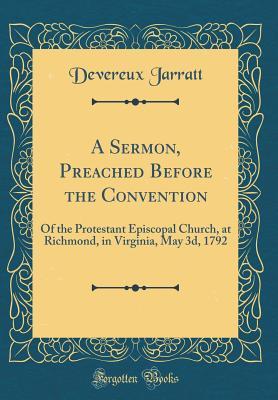- Bible
- Read the Bible
- Bible Versions
- Verse of the Day
- Reading Plans
- Verses by Topic
- Books of the Bible
- Bible Images
- Study
- Commentaries
- Concordances
- Dictionaries
- Encyclopedias
- Sermons
- Bible Atlas & Maps
- BP Wiki
- Devotionals
- Today's Devotionals
- Light of the World
- All Devotionals
- Inspirational Quotes
- More
- Picture Quotes
- Videos
- Inspirational
- Bible Study
- What The Bible Says
- Bible Q&As
- Daily Bread
- Bible by Genre
- Bible Stories
- Random Bible Verse
- Community
- Store
A Sermon, Preached Before the Convention: Of the Protestant Episcopal Church, at Richmond, in Virginia, May 3d, 1792 (Classic Reprint)
by Devereux Jarratt
Excerpt from A Sermon, Preached Before the Convention: Of the Protestant Episcopal Church, at Richmond, in Virginia, May 3d, 1792
I. Take beed to yourselves. This is the firll particular in the text and it is truly the firll and moll elfential qual ification in a gofpel miniller. He that does not take good heed to himfelf, is not likely to take good heed to the fouls of others; or indeed to do any thing elfe, belonging to his facred office, in a becoming manner.
About the Publisher
Forgotten Books publishes hundreds of thousands of rare and classic books. Find more at www.forgottenbooks.comwww.forgottenbooks.com
This book is a reproduction of an important historical work. Forgotten Books uses state-of-the-art technology to digitally reconstruct the work, preserving the original format whilst repairing imperfections present in the aged copy. In rare cases, an imperfection in the original, such as a blemish or missing page, may be replicated in our edition. We do, however, repair the vast majority of imperfections successfully; any imperfections that remain are intentionally left to preserve the state of such historical works.
I. Take beed to yourselves. This is the firll particular in the text and it is truly the firll and moll elfential qual ification in a gofpel miniller. He that does not take good heed to himfelf, is not likely to take good heed to the fouls of others; or indeed to do any thing elfe, belonging to his facred office, in a becoming manner.
About the Publisher
Forgotten Books publishes hundreds of thousands of rare and classic books. Find more at www.forgottenbooks.comwww.forgottenbooks.com
This book is a reproduction of an important historical work. Forgotten Books uses state-of-the-art technology to digitally reconstruct the work, preserving the original format whilst repairing imperfections present in the aged copy. In rare cases, an imperfection in the original, such as a blemish or missing page, may be replicated in our edition. We do, however, repair the vast majority of imperfections successfully; any imperfections that remain are intentionally left to preserve the state of such historical works.
BUY NOW
Hardcover, 32 pages
Published April 24th 2018 by Forgotten Books (first published September 27th 2015)
© 2025 Bibleportal.com All rights reserved.

Devereux Jarratt reached his widest fame as a leader of the Great Awakening in Virginia during the 1760s and 1770s. Surprisingly he participated in this revivalist movement as an Anglican and later an Episcopalian minister. Jarratt was born near Richmond, Virginia, on 17 January 1733 and raised in the Church of England.
Jarratt traveled to England in 1762 and was ordained in the Church of England even though he had been converted by Presbyterians. He returned to Virginia in 1763 and began preaching at the church in Bath, a town in the southern reaches of the colony. His powerful, musical voice together with his intensely emotional preaching brought large crowds to his church, and his ministry rapidly expanded.
He continued to preach into the 1800s, but to ever-smaller groups. The decline in his work mirrored the decline of Episcopalianism in the South. Jarratt died in Bath from cancer on 29 January 1801. After his death his work continued with the publication of his Autobiography in 1806, which he had written as a model for leading a Christian life and as a last effort to bring people to the true God.
... Show more